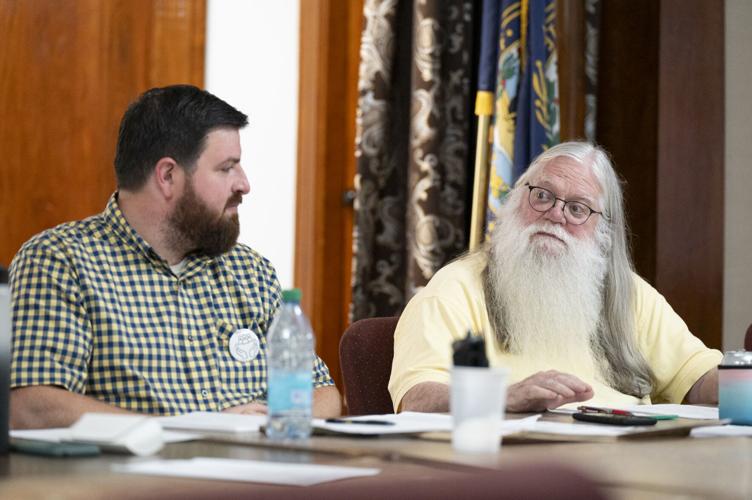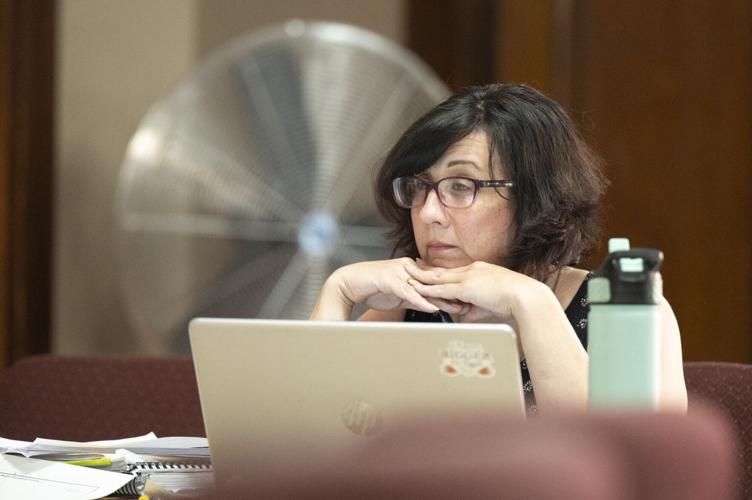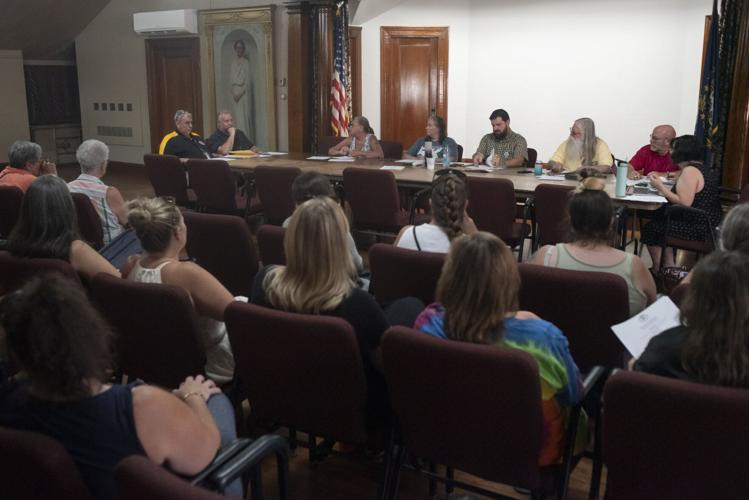FRANKLIN — City councilors and school board members came together to brainstorm solutions to address a funding shortfall for the Franklin School District, during a Joint Finance Committee meeting Tuesday evening at Franklin Public Library.
Members of the committee include co-chairs Councilor Tom Boyce (Ward 2) and school board member Michael Lombardo, Councilor Al Warner (Ward 3), and school board members Laurie Cass and Marie Danforth, and Councilor Timothy Johnston (Ward 1), who was not present. Superintendent Dan LeGallo and School Business Administrator Jefferson Braman also attended the meeting, as well as Mayor Desiree McLaughlin.
The discussion focused on action planning, goals, long-term sustainability and growth, and measures of success for the school district. It comes after the district received notice a grant from the U.S. Department of Homeland Security was terminated, as well as an unspecified expected shortfall in adequacy aid from the state.
LeGallo said his district will use attrition and not fill open positions to make up for some of the deficit, which includes a loss of about $240,000 from the Targeted Violence and Terrorism Prevention Program grant.
“That's the strategy that we always use. This is not a new concept to us here in Franklin, you know, not having the funds we need to fund our schools appropriately,” LeGallo said. “That's the strategy we've been using since I've been here.”
Lombardo aimed to highlight the underfunding of the school district. He distributed information including bell curve graphs of median household income, and the statewide municipal budget split, pointing out where Franklin, and its neighbor Tilton, landed on each. The median household income for Franklin was just under $69,000, and in Tilton $66,000. But Franklin’s school district receives only 35% of the city’s budget distribution, while Tilton schools receive 55%.
Lombardo centered the discussion on the possibility of increasing the school’s budget split percentage, even by 1%. McLaughlin pushed back, saying it was a premature ask, during the committee's second meeting. The first was June 30.
“We're waiting for the shakedown, too. Federal, state, we're losing grants,” she said. “Both of our budgets are unsustainable right now. I don't [think] we're there yet.”
Warner agreed, but wants to see more funding for schools. He brought up the ConVal v New Hampshire case, which stated the base adequate education aid, at $4,182, is unconstitutionally low, and should be raised to $7,356. He thinks that is still a conservative number.
“I'm going to step aside from my Republican cohort and ask, not ask, but demand that the Legislature in Concord take some substantive action regarding the judicial decisions that were put on the table.”
The discussion also focused on the high cost of special education in the district. Special education is the second largest expense on the budget — over 20% of the $19.7 million fiscal year 2025-26 budget — at $3.97 million. LeGallo said not only has the need for special education grown, especially since the beginning of the COVID pandemic, but specialists who can provide the necessary services are fewer and far between, which means higher costs.
“It's a supply and demand issue. Districts are paying unbelievable amounts to contractors to have the people they are federally mandated to have, to support the kids’ needs,” LeGallo said. “And of course, we want to support the kids’ needs.”
LeGallo said the district has already taken steps to reduce costs. He said Franklin as well as other school districts in the Lakes Region have collaborated on a consortium to create a more local specialized placement. This way, they can provide potentially better services at a lower cost.
Franklin school administrators are looking to hire their own specialized employees like occupational therapists, speech pathologists and school psychologists, which could save up to $80,000 for next year, instead of relying on contractors. They also have purchased and repurposed a van to serve as a school bus, driven by a school bus driver to transport any out-of-district kids to their respective locations.
Committee members established metrics to determine the group's success. For now, it is a combination of standardized test scores, graduation rates, acceptance rates of higher education, and employment rates post-graduation.
“I’d like to pave a road and graduate a class of high school students that can read,” Warner said.
LeGallo said he is not panicked for the coming school year. He is, however, worried about fiscal year 2027. Teacher negotiations are upcoming, and LeGallo thinks teachers are “woefully underpaid,” especially compared with their neighbors in Tilton. But increased salaries won't add new employees, and he worries teachers may flee for higher paying roles. The school district has already cut 37.5 positions in the past two years.
“Let's say we gave the teachers $1 million to get their salaries up to not even par, but just better. That wouldn't add one employee to the district. That would just give people a living wage."
Lombardo was pleased with the communication and brainstorming at the meeting. While he believes everyone should be a student of history, he thinks it’s worthwhile to be forward-thinking.
“I think this group, with this level of collaboration, has an opportunity here to build consensus with the community. And to move forward and get Franklin moving into the right direction.”




















(0) comments
Welcome to the discussion.
Log In
Keep it Clean. Please avoid obscene, vulgar, lewd, racist or sexually-oriented language.
PLEASE TURN OFF YOUR CAPS LOCK.
Don't Threaten. Threats of harming another person will not be tolerated.
Be Truthful. Don't knowingly lie about anyone or anything.
Be Nice. No racism, sexism or any sort of -ism that is degrading to another person.
Be Proactive. Use the 'Report' link on each comment to let us know of abusive posts.
Share with Us. We'd love to hear eyewitness accounts, the history behind an article.